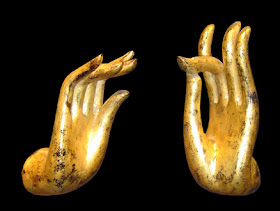The following excerpts are from Raymond Tallis’ marvelous book, The Hand: A Philosophical Inquiry into Human Being (2003), the first work in a trilogy, the other two volume of which I hope to introduce at a later date.
“The burden of this book is that the special relationship we indubitably enjoy with respect to the material universe…is to a very great extent the result of the special virtues of our hands. Whether or not we sit at the right hand of God in the order of things, our belief that we do, and the evidence apparently justifying that belief, owes much to seemingly unimportant facts as that the thumb has uniquely free movements. [….] This hand—this professor of grasping, seizing, pulling, plucking, picking, pinching, pressing, patting, poking, prodding, fumbling, squeezing, crushing, throttling, punching, rubbing, scratching, groping, stroking, caressing, fingering, drumming, shaping, lifting, flicking, catching, throwing, and much else besides—is the master tool of human life.”—Raymond Tallis
“The origin of the sense of agency has been attributed to the special powers and virtues of the human hand. This organ makes possible the transformation of our relationship to our own bodies into an instrumental one, as opposed to one of ‘dumb’ suffering. [….] What we are proposing is that the greatly enhanced freedom of choice, with an expanded manipulative indeterminacy constrained by a closer respect for the manipulandum, and an intensifed self-addressing through ‘meta-fingering’ took hominids over a threshold that other primates were near—to progressive instrumentalisation of the body and the creation of tools and the instrumentalisation of the relationship to the world (and a world as a world of objective presences)—and that this ultimately led to the difference between the life that beasts live—suffer, endure, experience—to the life that humans lead. Just as the genius of manipulation was built on the genius of reaching, so opposability built on reaching and independent finger movement, to create the very special constrained, manipulative freedom that makes the hand a tool, the human body instrumental and the human being an agent. Opposability put the last coping stone in place that permitted humans to remain above nature long enough to create their own place outside of nature. By this means we moved from prehension to apprehension to comprehension. Through the gap that is opened up between the body and itself, a subject-object gap created in the first instance by the exploring, active hand, the distinctively human world enters the world of organic nature.”—Raymond Tallis























No comments:
Post a Comment